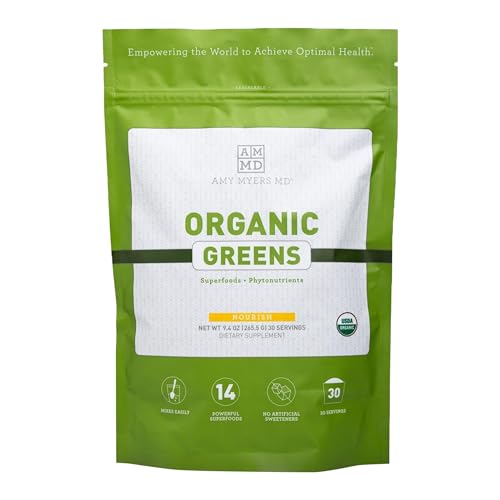

Dr. Amy Myers Organic Greens Powder - Nutrient-Dense Superfood Blend, Non-GMO, 270g


Retinol (Vitamin A)
High RiskRetinol (vitamin A) is a naturally occurring substance primarily known for its role in skin health, often included in products aimed at improving skin texture and reducing signs of aging. It functions as a potent ingredient in skincare formulations, enhancing cellular turnover and promoting collagen production.
Sustai Insights
Retinol offers functional benefits such as enhancing skin absorption and improving skin appearance through increased turnover and collagen synthesis. However, its usage is associated with high concerns regarding developmental and reproductive toxicity and potential irritation. Environmental risks include its contribution to pollution, while regulatory bodies impose strict usage restrictions. Overall, the risk level is assessed as high, necessitating careful consideration in its application and the exploration of safer alternatives.
Calcium
Medium RiskCalcium is a chemical element commonly found in various compounds and is essential for biological functions, particularly in bone health and cellular processes. It is utilized in products for its role in maintaining structural integrity and as a dietary supplement.
Sustai Insights
Calcium offers functional benefits such as supporting bone health and acting as a buffering agent in formulations. While generally safe, it presents moderate allergenic potential and concerns regarding persistence and bioaccumulation in the environment. Regulatory bodies have minimal restrictions, indicating a low risk for carcinogenicity and developmental toxicity. Safe usage practices should be adhered to, especially for sensitive populations. Alternatives like plant-based calcium sources may be considered for those seeking sustainable options. Overall, the risk level associated with calcium is assessed as medium.
Sodium
Low RiskSodium is a chemical element commonly used in various products, primarily as a preservative and stabilizing agent. It is involved in numerous reactions, contributing to the overall functionality and safety of formulations.
Sustai Insights
Sodium serves as an effective preservative, helping to extend product shelf life. It is generally recognized as safe with low concerns for carcinogenicity, allergies, and reproductive toxicity. However, excessive exposure may lead to health issues like hypertension. Environmentally, sodium is considered low risk regarding pollution and bioaccumulation. Regulatory bodies have not imposed significant restrictions on its use. Overall, the risk associated with sodium is low, making it a suitable ingredient with no major health or environmental concerns.
Spirulina
Low RiskSpirulina is a blue-green microalga known for its high nutritional profile, including proteins, vitamins, and antioxidants. It is commonly used as a dietary supplement and ingredient in health foods, offering various functional benefits such as promoting energy and supporting immune health.
Sustai Insights
Spirulina is recognized for its functional benefits, including high protein content and antioxidant properties, making it a valuable dietary supplement. It is sustainably sourced and biodegradable. Health risks are minimal, with low concerns regarding carcinogenicity, allergies, or reproductive toxicity, and it is not subject to significant regulatory restrictions. Overall, the risk level is assessed as low, indicating a favorable profile for use in food and supplements.
Potassium
Low RiskPotassium is a naturally occurring mineral essential for various biological functions, including maintaining fluid balance, muscle contractions, and nerve signaling. It is commonly used in food and cosmetic products as a salt substitute and to enhance product stability.
Sustai Insights
Potassium has functional benefits such as supporting hydration and overall cellular function. It is generally recognized as safe, with low concerns regarding carcinogenicity, allergies, and reproductive toxicity. Environmental risks are minimal, as it does not significantly contribute to pollution. Regulatory bodies have not imposed restrictions on its use. Overall, potassium is assessed as low risk, with safe usage practices recommended for optimal benefits.
Iron
Low RiskIron is a mineral that plays a vital role in various biological processes, primarily as a component of hemoglobin in red blood cells, facilitating oxygen transport. It is commonly used in dietary supplements and food fortification to address iron deficiency and support overall health.
Sustai Insights
Iron offers essential functional benefits, such as improving oxygen circulation and supporting metabolic processes. It is generally considered safe with low risks for carcinogenicity, allergenic potential, and reproductive toxicity. Regulatory bodies like the FDA do not impose significant restrictions on its use. However, excessive iron intake can lead to health risks, including toxicity. Environmentally, iron is not known to be a pollutant or bioaccumulative. Overall, iron is assessed as low risk, with safe usage practices advised, including monitoring intake levels. Alternatives for supplementation include dietary sources like spinach and legumes.
Sodium
Low RiskSodium is a chemical element commonly used in various products, primarily as a preservative and stabilizing agent. It is involved in numerous reactions, contributing to the overall functionality and safety of formulations.
Sustai Insights
Sodium serves as an effective preservative, helping to extend product shelf life. It is generally recognized as safe with low concerns for carcinogenicity, allergies, and reproductive toxicity. However, excessive exposure may lead to health issues like hypertension. Environmentally, sodium is considered low risk regarding pollution and bioaccumulation. Regulatory bodies have not imposed significant restrictions on its use. Overall, the risk associated with sodium is low, making it a suitable ingredient with no major health or environmental concerns.
Calcium
Medium RiskCalcium is a chemical element commonly found in various compounds and is essential for biological functions, particularly in bone health and cellular processes. It is utilized in products for its role in maintaining structural integrity and as a dietary supplement.
Sustai Insights
Calcium offers functional benefits such as supporting bone health and acting as a buffering agent in formulations. While generally safe, it presents moderate allergenic potential and concerns regarding persistence and bioaccumulation in the environment. Regulatory bodies have minimal restrictions, indicating a low risk for carcinogenicity and developmental toxicity. Safe usage practices should be adhered to, especially for sensitive populations. Alternatives like plant-based calcium sources may be considered for those seeking sustainable options. Overall, the risk level associated with calcium is assessed as medium.
Spirulina
Low RiskSpirulina is a blue-green microalga known for its high nutritional profile, including proteins, vitamins, and antioxidants. It is commonly used as a dietary supplement and ingredient in health foods, offering various functional benefits such as promoting energy and supporting immune health.
Sustai Insights
Spirulina is recognized for its functional benefits, including high protein content and antioxidant properties, making it a valuable dietary supplement. It is sustainably sourced and biodegradable. Health risks are minimal, with low concerns regarding carcinogenicity, allergies, or reproductive toxicity, and it is not subject to significant regulatory restrictions. Overall, the risk level is assessed as low, indicating a favorable profile for use in food and supplements.
Potassium
Low RiskPotassium is a naturally occurring mineral essential for various biological functions, including maintaining fluid balance, muscle contractions, and nerve signaling. It is commonly used in food and cosmetic products as a salt substitute and to enhance product stability.
Sustai Insights
Potassium has functional benefits such as supporting hydration and overall cellular function. It is generally recognized as safe, with low concerns regarding carcinogenicity, allergies, and reproductive toxicity. Environmental risks are minimal, as it does not significantly contribute to pollution. Regulatory bodies have not imposed restrictions on its use. Overall, potassium is assessed as low risk, with safe usage practices recommended for optimal benefits.
Iron
Low RiskIron is a mineral that plays a vital role in various biological processes, primarily as a component of hemoglobin in red blood cells, facilitating oxygen transport. It is commonly used in dietary supplements and food fortification to address iron deficiency and support overall health.
Sustai Insights
Iron offers essential functional benefits, such as improving oxygen circulation and supporting metabolic processes. It is generally considered safe with low risks for carcinogenicity, allergenic potential, and reproductive toxicity. Regulatory bodies like the FDA do not impose significant restrictions on its use. However, excessive iron intake can lead to health risks, including toxicity. Environmentally, iron is not known to be a pollutant or bioaccumulative. Overall, iron is assessed as low risk, with safe usage practices advised, including monitoring intake levels. Alternatives for supplementation include dietary sources like spinach and legumes.
Retinol (Vitamin A)
High RiskRetinol (vitamin A) is a naturally occurring substance primarily known for its role in skin health, often included in products aimed at improving skin texture and reducing signs of aging. It functions as a potent ingredient in skincare formulations, enhancing cellular turnover and promoting collagen production.
Sustai Insights
Retinol offers functional benefits such as enhancing skin absorption and improving skin appearance through increased turnover and collagen synthesis. However, its usage is associated with high concerns regarding developmental and reproductive toxicity and potential irritation. Environmental risks include its contribution to pollution, while regulatory bodies impose strict usage restrictions. Overall, the risk level is assessed as high, necessitating careful consideration in its application and the exploration of safer alternatives.
Discover the power of health with Organic Greens Powder Superfood Juice from The Myers Way Protocol. This nutrient-rich blend features 14 USDA Certified Organic plant foods, providing essential support for your daily wellness journey.
- Nutrient-Rich Support: Packed with spirulina and chlorella, this greens powder delivers a potent dose of phytonutrients that enhance your daily nutrition.
- Immunity Boosting Ingredients: Infused with antioxidant-rich turmeric and ginger, plus ashwagandha for adrenal support, it fortifies your immune defense.
- Easy to Use: Simply mix one scoop with 8-10 ounces of water or your favorite beverage daily to enjoy its health benefits without hassle.
- Allergen-Friendly Formula: Free from GMOs, artificial sweeteners, gluten, dairy, and eggs, this superfood is suitable for a variety of dietary needs.
- Empower Your Health: Designed to educate and empower consumers, this supplement promotes a proactive approach to wellness, encouraging you to reclaim your health sustainably.
Subscribe & Save with Sustai
- Best Price Guarantee: Always enjoy the lowest prices on sustainable home essentials.
- No Surprises: We’ll notify you before shipping. No hidden fees, ever.
- You’re in Charge: Change, pause, or cancel your subscription anytime with ease.
- Eco-Friendly Deliveries: Our grouped shipments mean less packaging and lower emissions.
Join us on a sustainable journey. Special offers for a limited time! Prices and promotions may change.
Recommended Products
Discover the power of health with Organic Greens Powder Superfood Juice from The Myers Way Protocol. This nutrient-rich blend features 14 USDA Certified Organic plant foods, providing essential support for your daily wellness journey.
- Nutrient-Rich Support: Packed with spirulina and chlorella, this greens powder delivers a potent dose of phytonutrients that enhance your daily nutrition.
- Immunity Boosting Ingredients: Infused with antioxidant-rich turmeric and ginger, plus ashwagandha for adrenal support, it fortifies your immune defense.
- Easy to Use: Simply mix one scoop with 8-10 ounces of water or your favorite beverage daily to enjoy its health benefits without hassle.
- Allergen-Friendly Formula: Free from GMOs, artificial sweeteners, gluten, dairy, and eggs, this superfood is suitable for a variety of dietary needs.
- Empower Your Health: Designed to educate and empower consumers, this supplement promotes a proactive approach to wellness, encouraging you to reclaim your health sustainably.

You can have at most 2 Sustainable Steals products in your cart
Customer Reviews
Customers’ View
Customers generally appreciate the nutrient-rich formula of the Organic Greens Powder, noting its effectiveness as a convenient substitute for traditional green juices. Many users commend the inclusion of high-quality organic ingredients such as spirulina and chlorella, which contribute to their overall health. Some customers have expressed enjoyment of the taste, describing it as healthy and pleasant, while others mentioned a strong sweetness that may not appeal to everyone. Despite mixed opinions on flavor, the product’s allergen-free and non-GMO attributes resonate well with health-conscious consumers. Overall, customers find this superfood aligns with their wellness goals, making it a valuable addition to their daily routines.
AI-generated from the text of customer reviewsThis product has no reviews yet.




